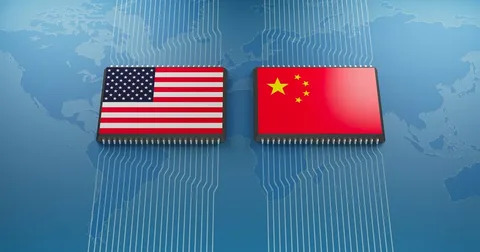China has put forth a request to the United States to reduce strict regulations on the export of Artificial Intelligence (AI) chips in the latest round of trade agreement talks. This request emphasizes China’s growing dependency and interest in artificial intelligence technology as a driving factor for the development of their digital economy.
In recent years, the United States has implemented strict controls on technology exports to China, particularly those related to advanced AI chips. These regulations originate from concerns over national security and potential misuse of technology. However, in a bid to promote smoother trade relations, China is now seeking a relaxation of these restrictions. This negotiation forms a critical aspect of the progressing trade discussions between the two economic giants.
The strength of the AI industry in China is reliant to a large extent on chips imported from the United States. Faced with stiff export controls, Chinese companies have experienced challenges procuring the necessary components for AI development. Rapid advancements in AI technology are pushing demand for these chips.
The relaxations sought by China are complex, revolving around both technical and national security hurdles. The US previously imposed stringent controls under the assumption that technology exports could inadvertently equip adversaries with advanced tools, posing potential security threats. Thus, easing export controls will require careful navigation of these security risks.
Currently, legislation governing technology exports in the United States treats advanced AI chips as potential security threats. Amending this approach would necessitate a shift in political perception and extensive policy revision.
Simultaneously, China’s effectively managing and protecting advanced AI technology would also be a precursor to relaxing export controls. Trust built on transparent and responsible handling of technology will be the cornerstone in facilitating negotiations.
Given these complexities, the roadmap to reaching a consensus is expected to be arduous. Both nations will be required to make substantial adjustments in their policies regarding technology exports and security.
Regardless of the challenges, China’s request indicates a critical and positive shift in the trade negotiations. It shows China’s readiness to advance in the AI industry and is expected to influence future discussions and might potentially serve as a model for other aspects of technological trade and cooperation.
The world is watching these negotiations with keen interest, understanding that the outcomes will significantly impact the global technology trade. It’s hoped that the cooperative processes will set the course for international trade dynamics in the AI sector and beyond.
Overall, these discussions represent an essential effort to strike a balance between technological advancements, trade interests, and national security priorities. With the relaxing of AI chip export control policies on the table, it remains to be seen whether both nations can adapt their stances to facilitate mutual growth and security. Read more


Leave a Reply